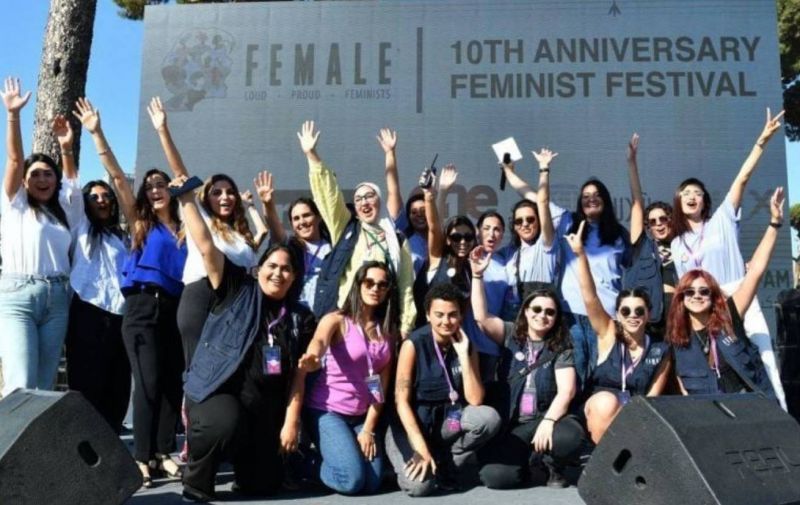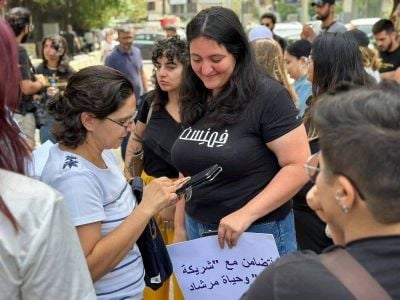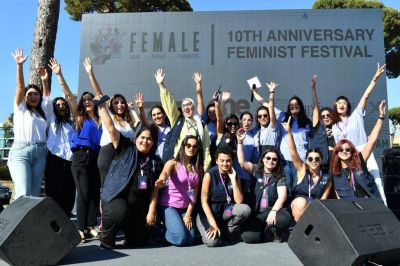
The feminist collective FEMALE celebrating its 10th anniversary at the Beirut Hippodrome. (Credit: Abbas Salman)
The FEMALE collective held a festival marking its 10th anniversary between June 23- 24 at the Beirut Hippodrome, despite online threats.
The event, which included concerts, panels and dialogue discussions, was attended by over 1,000 people under the slogan, Loud, Proud, Feminist.
“We wanted to celebrate this decade of efforts in a way that brings us together. We decided not to organize a gala or a dinner in a hotel. Feminism should be accessible to everyone. That’s why the festival is free and that’s why we offer fun activities,” Mirshad told L’Orient-Le Jour.
She added that the festival aimed to “prevent all forms of violence and discrimination against women.”
Round table discussions on women in business, politics, sport, medicine and technology were held, and various artists performed on stage during the two-day event.
In the evenings, DJs and bands took over to attract as many people as possible, according to Paola Rebeiz, co-organizer of the event.
“Civil society in all its diversity is here. Children, teenagers, the elderly and young adults, making a total of around 2,000 participants,” Rebeiz said.
The event was not only attended by women. “It's important that men come and support this kind of event. I hope to encourage others to become feminists,” said Rami, a student who attended to support women’s rights.
Several visitors said they were happy to take part in a festival that brought together so many people from such diverse backgrounds and identities.
“I love it here! There are young people, older people, LGBTQ+ people, women, men and so on. It’s rare in a country like Lebanon,” said Maria*, an activist and feminist.
Funded entirely by donations and sponsors, the festival also shed light on local businesses run by women. Shops selling homemade goods were set up in small white tents, alongside small Lebanese businesses.
According to Zahya*, a young creator selling cups and decorative items, it was an opportunity to encourage women to go into business.
“I started my business against my parents’ wishes. They thought I’d never be able to sell my products. Now I export to several countries and earn a living from it,” she proudly said.
Social intersectionality
The fact that this festival received threats makes it all the more important to Lebanese society.
“When you’re threatened, you know you’re on the right track,” said an LGBTQ+ rights activist who declined to be named.
Despite the threats, Mirshad held the festival as planned, alerting the authorities to ensure everyone’s safety.
“We want to send out the message that we’re staying put. Threats are nothing new and neither are crackdowns. We won’t be silent,” Mirshad said.
Many participants, shopkeepers and speakers stressed the importance and impact of such a festival, especially in a country where women’s rights are trampled on or even regressing.
“This festival is yet another cry that it’s time to put an end to the structural discrimination on which this country’s laws are based,” said Roula Najem, researcher and journalist with Seeds for Legal Initiatives.
According to Nadine Moussa, Lebanon’s first female presidential candidate who ran in the 2014 elections, , this celebration is an opportunity to renew hope and start important conversations among the public.
There is “a thirst [among the public] to learn about their rights,” said Najem.
“For me, this should be an annual event,” said Amal Charif, one of the events panelists who spoke about social intersectionality, particularly between disability and feminism. She however noted that it is difficult for Lebanon to adopt the intersectional approach to feminism that she spoke of.
Mia Allawi, actress and anti-racism activist, also echoed this sentiment in her speech. “We must continue to raise awareness and educate,” she said, denouncing the discrimination suffered by domestic workers in the country.
*Surnames have not been mentioned at the request of the interviewees.
This article was originally published in French in L'Orient-Le Jour. Translation by Joelle El Khoury.


